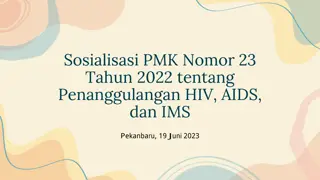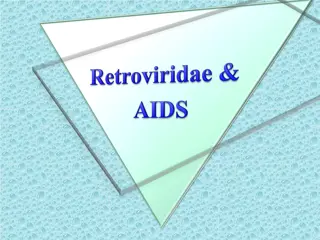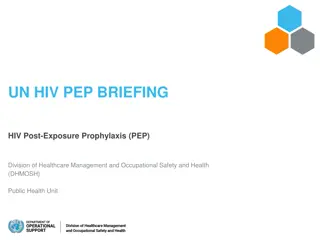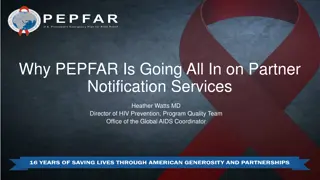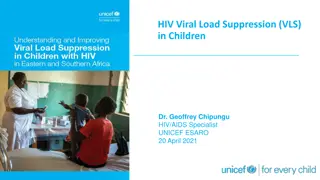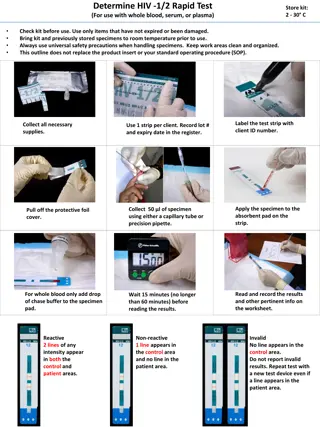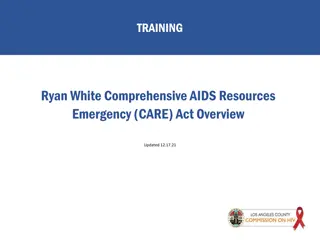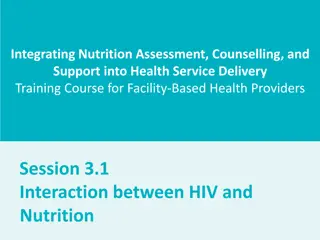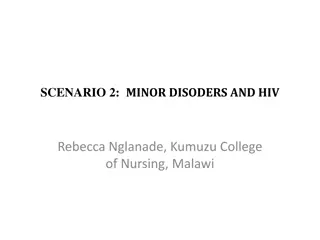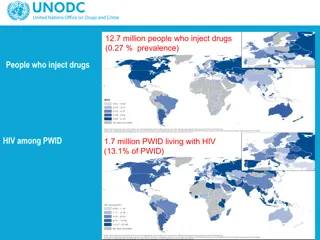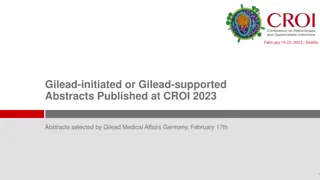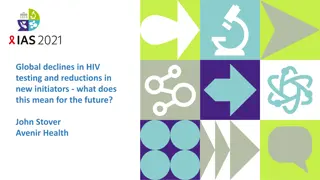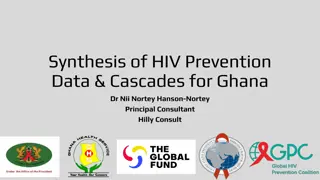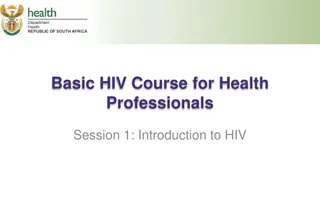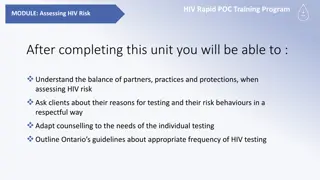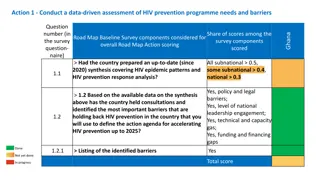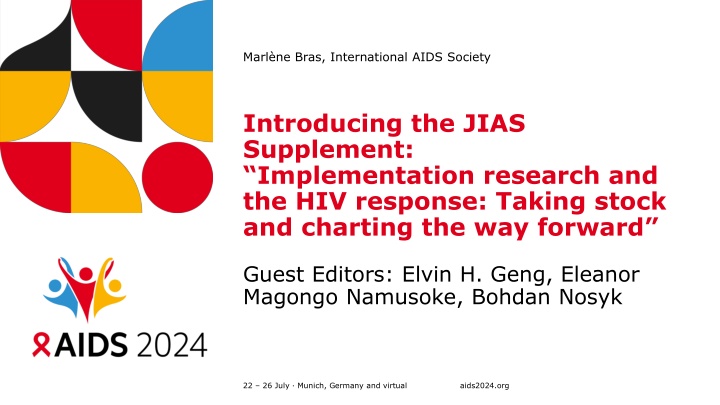
Introducing the JIAS Supplement: Implementation Research in HIV Response
This JIAS Supplement focuses on advancing equitable reach, sustainable systems, and universal health coverage in the HIV response through innovative strategies and novel interventions. Twelve articles cover a range of interventions like partner services, HIV self-testing, ART therapy, and PrEP, with a focus on implementation science methods and global geographies.
Download Presentation

Please find below an Image/Link to download the presentation.
The content on the website is provided AS IS for your information and personal use only. It may not be sold, licensed, or shared on other websites without obtaining consent from the author. If you encounter any issues during the download, it is possible that the publisher has removed the file from their server.
You are allowed to download the files provided on this website for personal or commercial use, subject to the condition that they are used lawfully. All files are the property of their respective owners.
The content on the website is provided AS IS for your information and personal use only. It may not be sold, licensed, or shared on other websites without obtaining consent from the author.
E N D
Presentation Transcript
Marlne Bras, International AIDS Society Introducing the JIAS Supplement: Implementation research and the HIV response: Taking stock and charting the way forward Guest Editors: Elvin H. Geng, Eleanor Magongo Namusoke, Bohdan Nosyk 22 26 July Munich, Germany and virtual aids2024.org
Access the Supplement https://bit.ly/3KvrKJu 22 26 July Munich, Germany and virtual aids2024.org
Why this Supplement? Implementation research for today s HIV response to: Advance equitable reach Shift to sustainable systems Push for service integration and universal health coverage 22 26 July Munich, Germany and virtual aids2024.org
Supplement overview Twelve articles covering: A wide range of interventions: Partner services, HIV self-testing, long-acting injectable antiretroviral therapy (ART) and stepped care for ART retention, and pre-exposure prophylaxis (PrEP) as well as responses at the population level and for key and vulnerable populations Implementation science methods: Consolidated Framework for Implementation Research (CFIR); Normalization Process Theory (NPT), ways of classifying strategies (using the Expert Recommendations for Implementing Change) and adaptations (using the Framework for Reporting Adaptations and Modifications-Enhanced [FRAME]) Geographies: Africa, Asia, Europe, North and South America 22 26 July Munich, Germany and virtual aids2024.org
Innovative strategies to extend the reach and efficiency of HIV testing Roy Paladhi et al. : RCT to assess the effectiveness of HIV self-testing (HIVST) when offered within assisted partner services (APS) in Western Kenya. Integrating HIVST into APS is an effective strategy for identifying people living with HIV Sharma et al.: APS trial - Examined extending partner services to female partners of male partners Programmatic approaches that leverage sexual networks to detect new cases are feasible and useful. Van Thi Thuy Nguyen et al. : Mixed-methods design to compare reach and effectiveness of a web-based HIVST intervention from pilot to scale-up in Viet Nam. Web-based self-testing in Viet Nam reached people at elevated risk of HIV, facilitating uptake of ART and direct linkage to PrEP initiations. 22 26 July Munich, Germany and virtual aids2024.org
Implementation and integration of novel HIV interventions into practice environments Vanhamel et al.: Extended Normalization Process Theory (NPT) to explain PrEP integration into HIV clinics in Belgium through interviews with clinic staff and observation. Wider adoption of a novel intervention is not simply replication at scale, but instead an adaptive process Chapuma et al.: Narrative synthesis to identify failure points in early infant diagnosis and treatment (using deductive coding from CFIR) and Proctor's actor, action, action target framework to develop concrete recommendations directed at policymakers, providers and clients. Nadia Nguyen et al.: used CFIR to conduct a cross-sectional survey looking at long-acting antiretroviral formulation into of 38 clinics in the US. clinics most interested in technical assistance to address workflow development, payor challenges, staffing shortages for patient coordination and demand generation. 22 26 July Munich, Germany and virtual aids2024.org
Methods to develop implementation strategies based on client and provider preferences Mugambi et al.: DCE to assess the attributes that pregnant women want from HIV prevention services delivered in pharmacies. Velloza et al.: Human-centred design to adapt a peer counselling approach to PrEP delivery settings in South Africa. Tan et al.: discuss how citizen science approaches can be leveraged to spur equity in HIV implementation science. Chhun et al.: used the Framework for Reporting Adaptations and Modifications- Expanded (FRAME) to characterize provider-identified adaptations to the implementation of a stepped care intervention for ART retention in youth. 22 26 July Munich, Germany and virtual aids2024.org
Simulation modelling for decision analysis and cost effectiveness Enns et al.: Estimate the cost-effectiveness and potential epidemiological impact of six real-world implementation interventions to increase the scale of delivery of interventions for HIV testing and PrEP in three cities in the US Study highlights the scalability of interventions as a key determinant of their impact at the city level 22 26 July Munich, Germany and virtual aids2024.org
Processes and systems Lujintanon et al.: systematic review to describe the features and distributions of published implementation strategies attempting to improve HIV treatment service delivery and outcomes Calls attention to gaps in the applied implementation research literature, highlighting that strategies most often target clients or providers Approaches that act at a higher level on processes and systems and mostly at the level of policymakers often are lacking 22 26 July Munich, Germany and virtual aids2024.org
Thank you! https://bit.ly/3KvrKJu 22 26 July Munich, Germany and virtual aids2024.org

